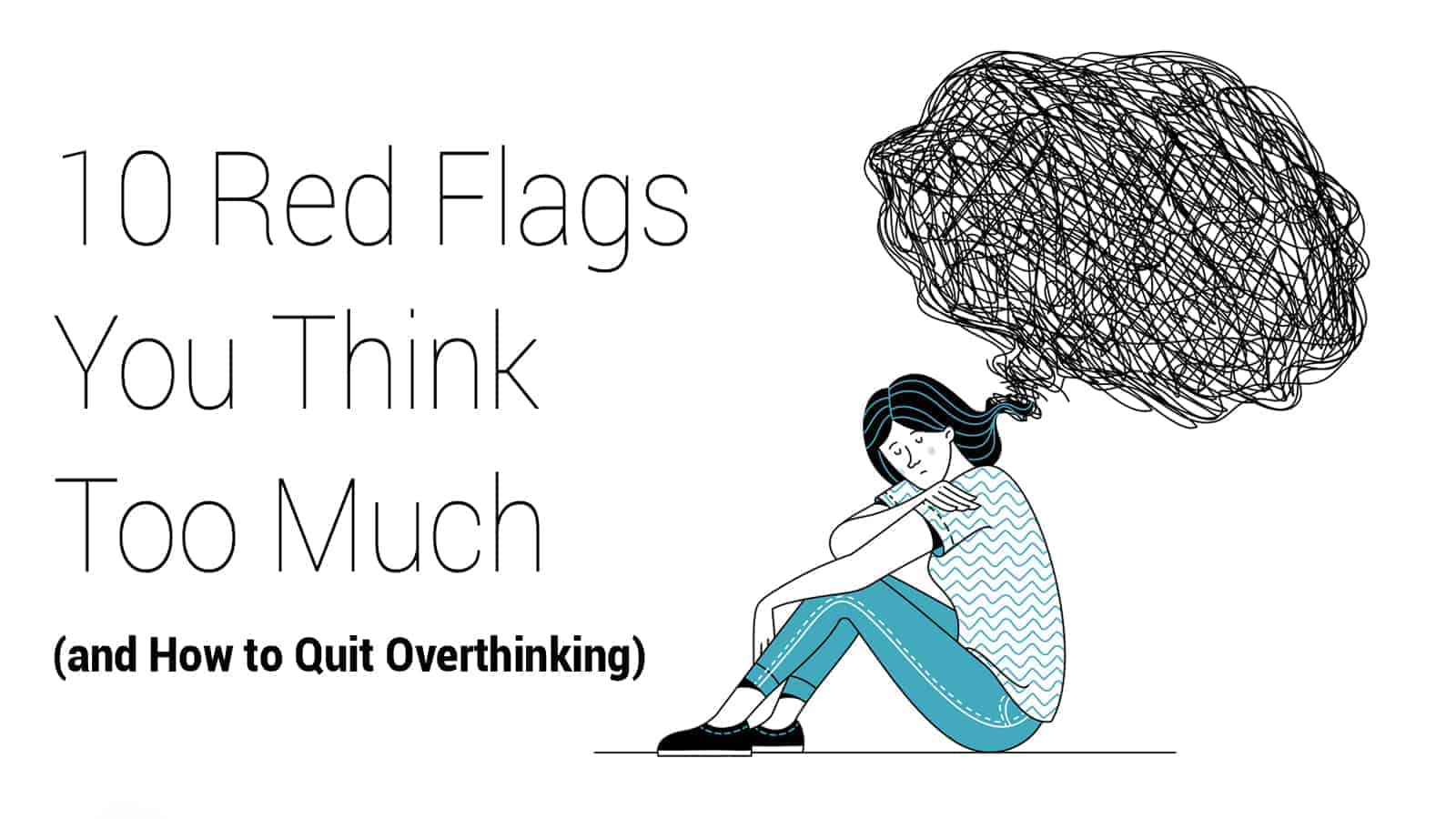Do you find that you think too much? When you overthink, you analyze everything to the point of anxiety. If you think you may be doing this, check out these ten indicators of overthinking and how they can be harmful to you. Later, we will share some tips to combat the cycle of overthinking to help you rebalance your state of mind.
What is overthinking?
The tendency to overthink means you have an abundance of thoughts that never work out into real action. These overactive thoughts produce nothing but stress and worry. You may worry about what happened in the past or what’s going to happen in the future. Overthinking is usually about things you can’t control. Thinking too much can be paralyzing and lead to an anxiety disorder. Consider these ten red flags you may see in your life if you’re struggling with overthinking.
1 – Lack of focus due to racing thoughts.
When you’re continually examining your thoughts, actions, and conversations, your thoughts get in the way of your ability to concentrate on your daily activities. Your ideas may weigh so heavily upon you that you become distracted from real-life responsibilities. If your thoughts interfere with your daily life tasks, it’s a red flag. Step back and figure out how to let go of thoughts that prevent you from living your life.2 – Your thoughts interfere with your work.
One study discovered that when athletes overthink, it disrupts their performance. It’s no wonder because when you overthink, you examine every action you make. This introspection causes you to second guess and doubts your ability to do things. A trained athlete relies on their mental and physical ability to perform. In the same way, if your mind is distracted, and you doubt your abilities, you won’t be able to do your work. This process can be disruptive to your job. This is a big red flag indicating that you’re overthinking things.
3 – Not paying attention to the people in your life.
Overthinking causes you to be caught up in your world most of the time. You aren’t fully there for others because of your all-consuming thoughts. Overthinking causes you to think more about yourself than others. When you’re with others, you may be distracted by views like this:
- How do I feel right now?
- Why do I feel like this?
- Does this person like me?
- They look sad. It’s probably because of me.
- What did I do wrong?
- Are they mad at me?
This rumination is a self-consuming way to live. You are not paying rapt attention to what others are saying or feeling. People may perceive you as uncaring or thoughtless, even though you aren’t. Overthinking is detrimental to your relationship with friends and family because it causes you to live in your head.
4 – What’s real?
Researchers found that overthinking interferes with your long term memory. As you rehearse things over and over, what happened gets rewritten in your mind. Things begin to look worse than they were when you rehearse them in your mind. It is easy to put a negative spin on the past. So what happened seems utterly different from what really happened, yet you believe your version of the situation. It’s a twisted web that affects your thoughts and feelings.
5 – Feel nervous all the time
Overthinking can make you feel always nervous. Your thoughts feel out of control and overwhelming. Being consumed with these thoughts steals your ability to relax. Your nervousness is unhealthy and could make you sick. Taking control of your thoughts is critical to avoid feeling nervous all the time.
6 – Physical ailments
Overthinking can lead to an anxiety disorder. Researchers have found that some physical illnesses are caused by anxiety and stress. These ailments include
- Headaches
- Ulcers
- Irritable bowel syndrome
- Strange aches and pains
- Insomnia
- High blood pressure
- Chest pain
- Panic attacks
If you’re having these physical problems and you think it could be related to your overthinking, be sure to speak with your doctor. They can diagnose the physical issues and help you find strategies to slow down your overactive thoughts.
7 – Fatigue
Your overthinking makes you feel as if the weight of the world is on your shoulders. This mental exhaustion leads to fatigue since your brain has no time to rest. Mental burnout causes extreme tiredness. All your introspection and constant thinking solve nothing, but it hurts you the most.
8 – Your rehash conversations
Rehashing your conversations with other people is a red flag indicating you’re overthinking. Do you rehearse every word, every smile, or eyebrow that moved during your discussions? Do you feel that you must understand everything the person said in case you missed something?
This rehashing of conversations twists your brain and makes you feel emotionally draining. These thoughts are harmful to you and could lead to an anxiety disorder. If you find yourself doing this a lot, you may consider possibly speaking to a counselor to help you figure out why, precisely, you are doing this.
9 – Insomnia
Insomnia can be a side effect of an overly active brain. If you’re an overthinker, your mind may race, even at night. In fact, night time can exaggerate your fears. That’s when you’re most vulnerable to worry. When your sleep is interrupted nightly, it affects your ability to function, plus it clouds your thoughts even more.
10 – Overanalyzing everything
When you think too much, you probably tend to overanalyze people’s every action and word. If you walk past a friend who doesn’t look at you right away, you assume they’re mad at you. You start to remember things you’ve said and wondered if you made them angry. You begin to worry that they’ll never speak to you again. Your snowballing thoughts run wild. It’s consuming and centers on what you did wrong.
How can you stop overthinking?
There are some helpful new habits you can try to break free from overthinking. When your thoughts start to run wild into all the possible things that could happen, stop, and ask yourself these questions.
- Is what I’m thinking right now true?
- Will these thoughts help me or make me feel bad?
- How could I look at this situation in a positive way?
- What are the chances that what I’m thinking could happen?
Here are some other helpful tools to break free from thinking too much.
1 – Focus on what’s good
When you’re tempted to overthink and expect bad things, instead, turn your thoughts to what is right. Think of all the positive outcomes in life that could (and have) happened. Remember, you control your thoughts. Your thoughts don’t control you. Refuse to permit your mind to go to the scary what-if scenarios. Tell your thoughts who’s boss and focus on the good in your life.
2 – Distract yourself
Having excess time on your hands isn’t helpful if you have a busy mind. Too much time allows time for your mind to run wild. Stay active, don’t let yourself idle time to just sit and think. Interact with people, go to events, or volunteer at your local library. Find ways to serve others, so you’re not focusing on yourself.
3 – Control is overrated
There are many scenarios in life that can’t be controlled, but there are things within your control. It’s part of life. Focusing on what you can’t control isn’t helpful, and it can lead to anxiety. Instead, focus on what outcomes you can control, like your attitude and your choices. Try to remember that you’re not the only one who feels like life gets out of control. Everyone has those moments. Many people find that having faith in God helps them. They believe they can trust God to help them through those uncontrollable situations. Take a deep breath and relax. Let go of what you can’t control.
4 – Loosen fear’s grip
Fear is a tyrant. It enables you to think too much about your failures or your potential failures. It’s easy to focus on all the ways you’ve messed up. But everyone fails. Failure is a big part of life. Let go of your fear of falling again or failing in the future. Refuse to let fear control your thoughts. See your failures as opportunities to have a new beginning.
5 – Journal writing helps you release your thoughts
Writing down all your thoughts is a great way to get your overthinking in control. Dumping those fearful, anxious thoughts on paper releases them from your brain. Tell yourself that once your opinions hit the paper, they stay there. No more thinking about them. If you want to reread the thoughts later, that’s okay, but don’t allow yourself to think about them again.
6 – Talk to a friend
Find a trusted friend or confidante to talk to about your overthinking. Explain to your friend when you’re prone to overthinking thinking. No doubt, they’ve already noticed that you do this. Just talking about overthinking with someone else can help you begin to let it go.
7 – Find community
Finding a good community can help you refocus. It keeps you busy being with and helping others instead of being alone with your thoughts. Find a church, yoga group, or running club where you can make good friends who share similar goals.
Final Thoughts: Now That You Know You Think Too Much, Take Action
Everybody over thinks things once in a while, but if your brain is always on hyper-drive, it could be harmful to your health. Overthinking can lead to anxiety disorders, which can affect your health. If you think too much, use these suggested tools to stop the progression of overthinking. Try a couple of these ideas at first and add more over time. Remember, you’re in control of your thoughts, not the other way around. Enjoy the freedom of letting go of those things you can’t control and enjoy your life without an overactive mind.
















 Community
Community

